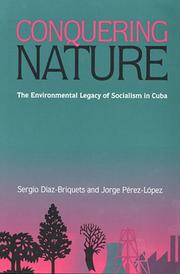| Listing 1 - 7 of 7 |
Sort by
|

ISBN: 0822957213 Year: 2000 Publisher: University of Pittsburgh Press
Abstract | Keywords | Export | Availability | Bookmark
 Loading...
Loading...Choose an application
- Reference Manager
- EndNote
- RefWorks (Direct export to RefWorks)
Conquering Natureprovides the only book-length analysis of the environmental situation in Cuba after four decades of socialist rule, based on extensive examination of secondary sources, informed by the study of development and environmental trends in former socialist countries as well as in the developing world. It approaches the issue comprehensively and from interdisciplinary, comparative, and historical perspectives. Based on the Cuban example, Diacute;az-Briquets and Peacute;rez-Loacute;pez challenge the concept that environmental disruption was not supposed to occur under socialism since it was alleged that guided by scientific policies, socialism could only beget environmentally benign economic development. In reality, the socialist environmental record proved to be far different from the utopian view. Between the early 1960s and the late 1980s the environmental situation worsened despite Cubars"s achieving one of the lowest population growth rates in the world and having eliminated extreme living standard differentials in rural areas, two of the primary reasons often blamed for environmental deterioration in developing countries. The governmentrs"s approach was to "conquer nature" and under its central planning approach, it did not take local circumstances into consideration. This disregard for the environmental consequences of development projects continues to this day despite official allegations to the contrary-as the country pursues an economic survival strategy based on the crash development of the tourist sector and exploitation of natural resources. An underlying conclusion of the book is that the environmental legacy of socialism will present serious challenges to future Cuban generations. Conquering Natureprovides, for the first time, a relevant analysis of socialist environmental policies of a developing country. It will be of interest to students and scholars of Cuba and those interested in environmental issues in developing countries.
Cuba --- Environmental Degradation --- Environmental Policy --- Socialism --- Political Science --- Science

ISBN: 0292750714 Year: 1983 Publisher: Austin University of Texas press
Abstract | Keywords | Export | Availability | Bookmark
 Loading...
Loading...Choose an application
- Reference Manager
- EndNote
- RefWorks (Direct export to RefWorks)
Mortality --- Public health --- History --- Cuba --- Statistics, Vital --- History.
Book
Year: 1983 Publisher: Washington (D.C.) : National academy press,
Abstract | Keywords | Export | Availability | Bookmark
 Loading...
Loading...Choose an application
- Reference Manager
- EndNote
- RefWorks (Direct export to RefWorks)
Book
ISBN: 0889361606 9780889361607 Year: 1978 Publisher: Ottawa Centre de recherches pour le développement international
Abstract | Keywords | Export | Availability | Bookmark
 Loading...
Loading...Choose an application
- Reference Manager
- EndNote
- RefWorks (Direct export to RefWorks)
Social change --- Economic geography --- Africa
Book
ISBN: 0889361339 Year: 1977 Publisher: Ottawa : International development research centre,
Abstract | Keywords | Export | Availability | Bookmark
 Loading...
Loading...Choose an application
- Reference Manager
- EndNote
- RefWorks (Direct export to RefWorks)
Migration, Internal --- Rural-urban migration --- Social change.
Book

ISBN: 9781685855345 1685855342 1588267180 Year: 2010 Publisher: Lynne Rienner Publishers
Abstract | Keywords | Export | Availability | Bookmark
 Loading...
Loading...Choose an application
- Reference Manager
- EndNote
- RefWorks (Direct export to RefWorks)
Does corruption grease the wheels of Latin American politics, facilitating its operation? Or does it undermine democratic rule and worsen the perennial problems of poverty and inequality. Do citizens condemn, condone, or simply acquiesce to the corrupt behavior of their politicians? Corruption and Politics in Latin America addresses these thorny questions, offering a fresh and timely approach to the subject. The authors' systematic comparative analysis of six countries—Argentina, Bolivia, Brazil, Cuba, Mexico, and Venezuela—focuses on patterns and underlying causes of corruption, the impact of political and economic changes, the effect of corruption on politics and society, and the nature and effectiveness of recent reforms. There is also a chapter devoted to regional and international efforts to attack corruption. With a common analytical approach reflected throughout, the book is both an accessible introduction and a source of new and provocative information and analysis.
Multi

ISBN: 9781685855345 9781588267184 Year: 2023 Publisher: Boulder Lynne Rienner Publishers
Abstract | Keywords | Export | Availability | Bookmark
 Loading...
Loading...Choose an application
- Reference Manager
- EndNote
- RefWorks (Direct export to RefWorks)
| Listing 1 - 7 of 7 |
Sort by
|

 Search
Search Feedback
Feedback About UniCat
About UniCat  Help
Help News
News